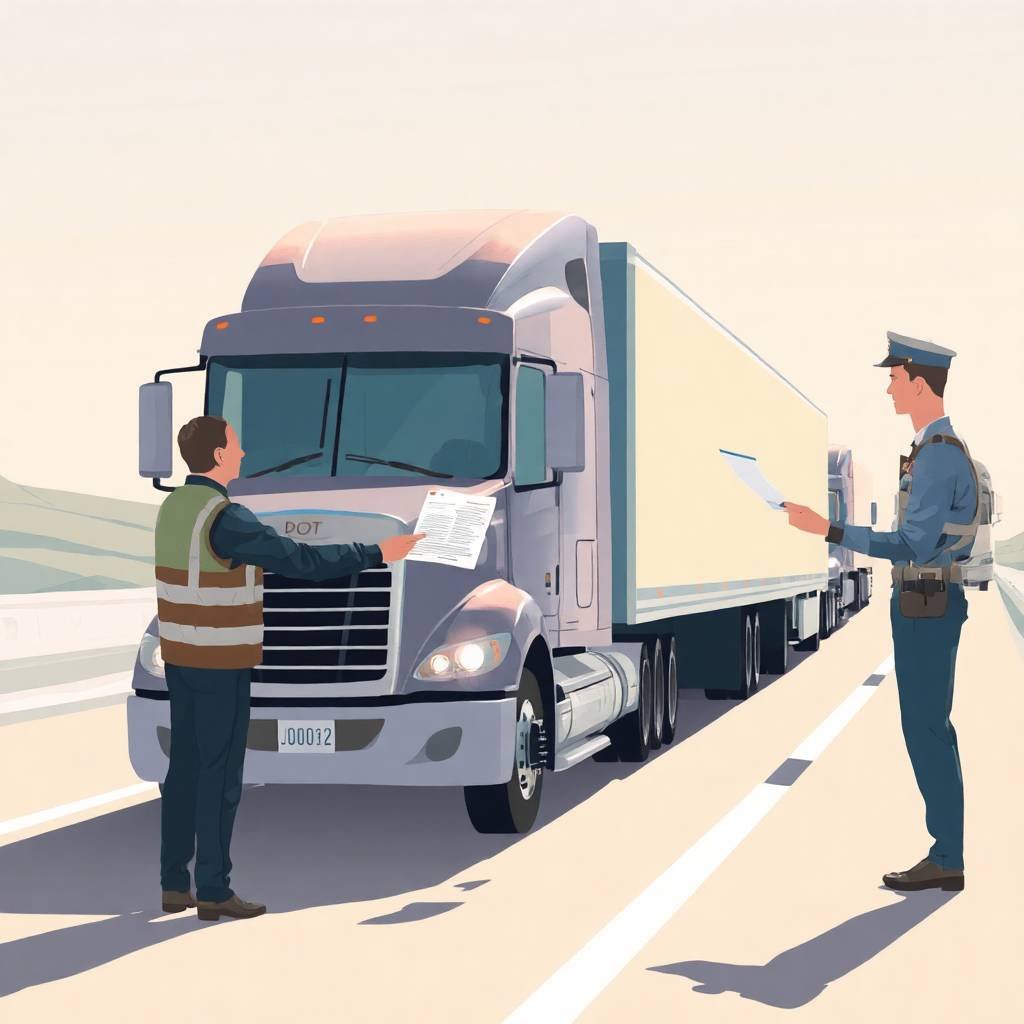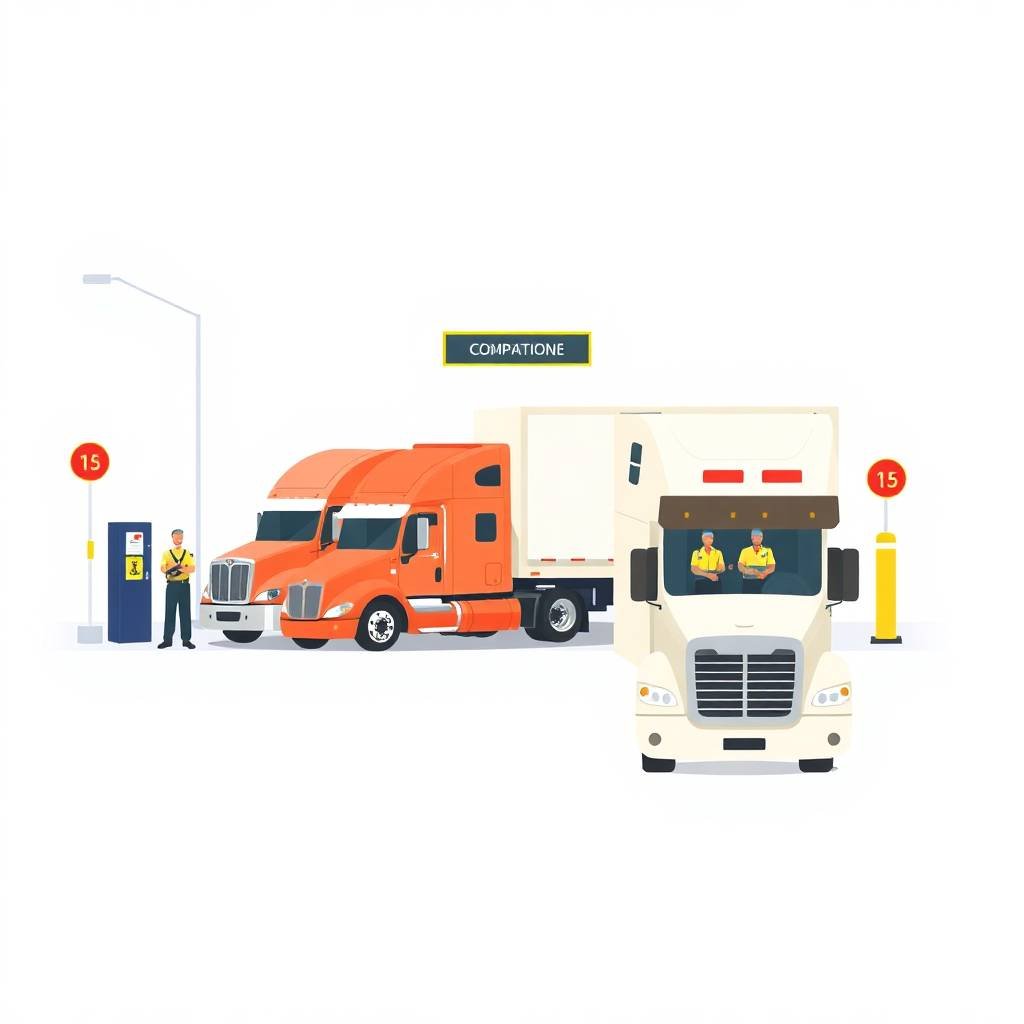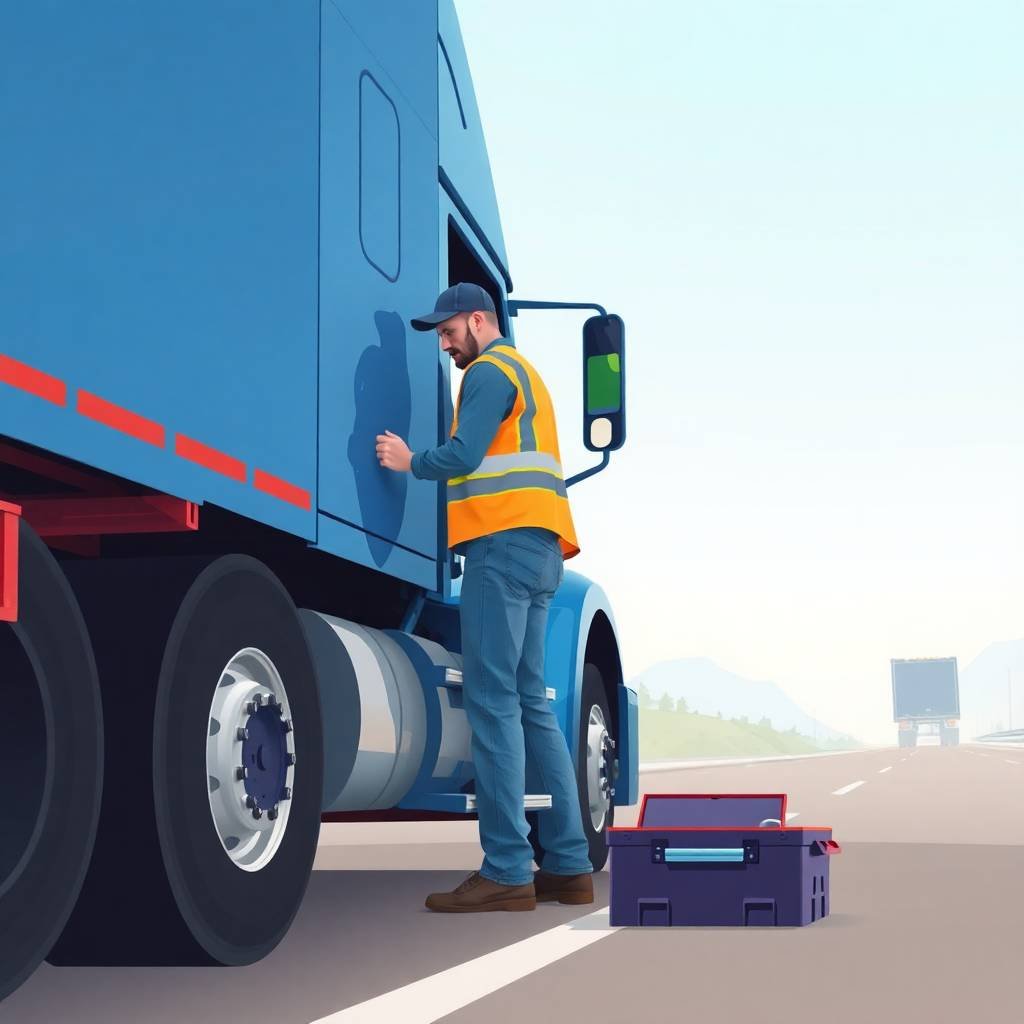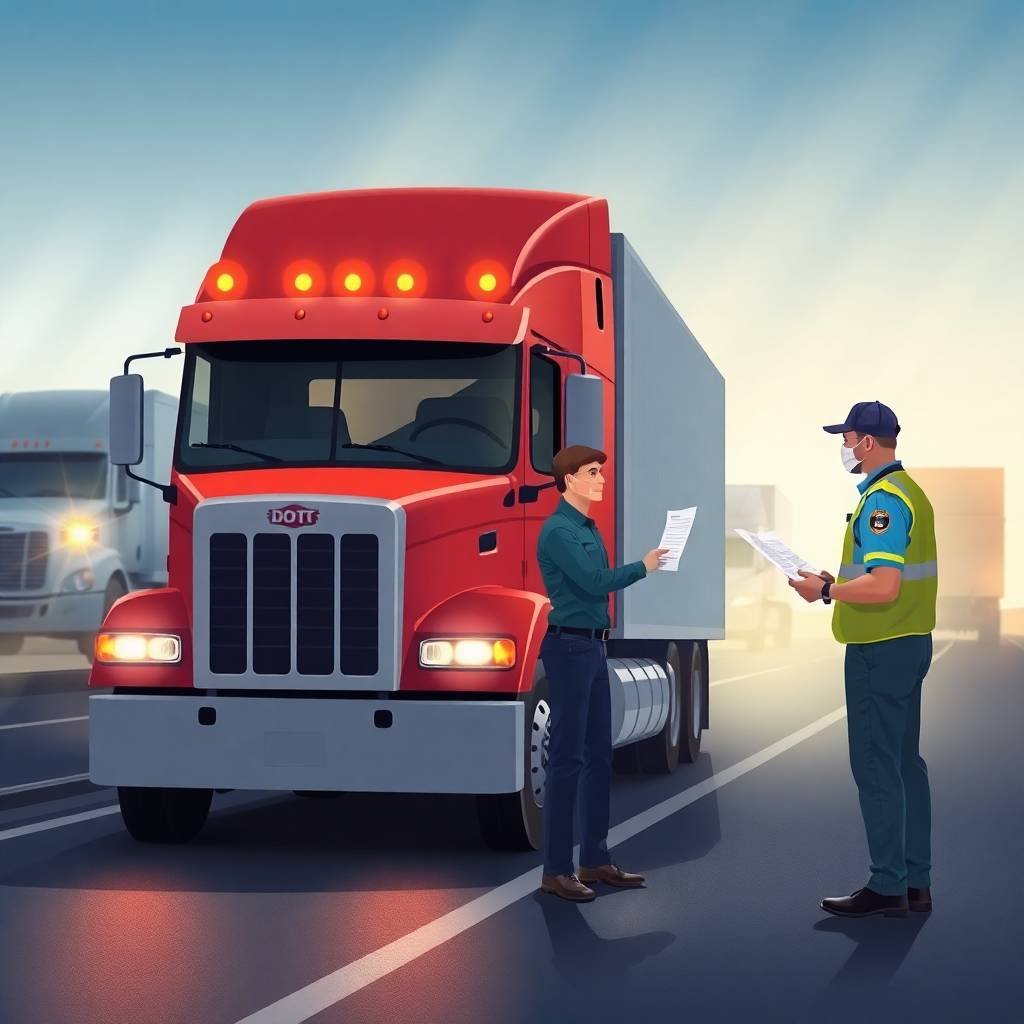1. What Is UCR and Why Does It Matter for Interstate Trucking Operations?
The Unified Carrier Registration (UCR) program is a federally mandated system that requires individuals and companies operating commercial vehicles in interstate or international commerce to register and pay an annual fee based on fleet size. It was established to ensure that all carriers contribute to the costs of highway safety programs.
The UCR applies not only to for-hire motor carriers but also to private carriers, freight forwarders, brokers, and leasing companies. One of the most common topics addressed in Unified Carrier Registration (UCR) FAQs is whether your business qualifies for this requirement and how to ensure compliance.
Understanding what UCR is and staying informed through trusted resources can help carriers avoid costly penalties and remain in good standing with the Federal Motor Carrier Safety Administration (FMCSA).
The Unified Carrier Registration (UCR) program is a federally mandated initiative requiring individuals and companies operating commercial motor vehicles in interstate or international commerce to register their business and pay an annual fee based on fleet size.
Established by the UCR Act of 2005, it replaced the Single State Registration System (SSRS) to streamline the registration process and ensure consistent enforcement across participating states.(CT.gov, UTC)
Who Must Comply with UCR?
According to the Federal Motor Carrier Safety Administration (FMCSA), entities required to register under the UCR program include:(Authority Express LLC)
- For-hire motor carriers transporting property or passengers across state lines.(UCR)
- Private motor carriers operating in interstate commerce.(CT.gov)
- Freight forwarders and brokers arranging interstate transportation.(Pennsylvania Public Utility Commission)
- Leasing companies providing commercial motor vehicles for interstate use.(movingauthority.com)
Even if a business is based in a non-participating state, such as Florida, it must register through a neighboring participating state if it engages in interstate commerce.(movingauthority.com)
Importance of UCR Compliance
Compliance with the UCR program is crucial for several reasons:
- Avoiding Penalties: Operating without proper UCR registration can result in fines ranging from $100 to $5,000, depending on the state and severity of the violation.
- Preventing Operational Disruptions: Non-compliance may lead to vehicles being detained during roadside inspections, causing delays and potential loss of business.
- Supporting Safety Programs: Fees collected through the UCR program fund critical safety initiatives and enforcement efforts aimed at enhancing road safety for all users.(Authority Express LLC)
UCR Registration Process
The UCR registration period opens on October 1st each year, with a deadline of December 31st. Fees are determined based on the number of commercial motor vehicles operated:(Foley Services, UCR)
- 0-2 vehicles: $41(Authority Express LLC)
- 3-5 vehicles: $121(Freight 360)
- 6-20 vehicles: $242
- 21-100 vehicles: $844
- 101-1,000 vehicles: $4,024(truckingauthority.com)
- 1,001 or more vehicles: $39,289(Authority Express LLC)
These fees are subject to change and should be verified annually. Registration can be completed online through the UCR National Registration System or with assistance from compliance service providers.(UCR)
Maintaining Compliance Beyond UCR
While UCR registration is a critical component of regulatory compliance, trucking companies must also adhere to other FMCSA requirements:
- Driver Qualification Files: Maintaining accurate and up-to-date Driver Qualification Files is essential for demonstrating driver eligibility and safety compliance.
- Drug and Alcohol Testing: Implementing a comprehensive Drug and Alcohol Testing Program helps ensure a safe operating environment and compliance with federal regulations.
- Safety Measurement System (SMS): Monitoring and managing your Safety Measurement System scores can impact your company’s safety rating and inspection frequency.
- Audit Preparation: Being prepared for DOT audits is vital to avoid penalties and maintain operating authority.
Seeking Professional Assistance
Navigating the complexities of UCR registration and broader compliance requirements can be challenging. Professional services are available to assist with:
- UCR Filing: Ensuring accurate and timely UCR filing to avoid penalties.
- Compliance Checklists: Utilizing DOT compliance checklists tailored for owner-operators and fleet managers.
- Safety Score Management: Implementing strategies for driver safety score management to improve safety ratings.
- Correcting Violations: Addressing and rectifying FMCSA violations promptly to maintain compliance.
For personalized guidance, consider scheduling an appointment with a compliance expert.
Conclusion
Understanding and complying with the Unified Carrier Registration (UCR) program is essential for interstate trucking operations. Beyond avoiding penalties, proper registration supports safety initiatives and ensures seamless operations across state lines.
Staying informed and seeking professional assistance can help maintain compliance and focus on business growth.
For more insights and updates on trucking compliance, visit Truckers Compliance Hub.
Note: For detailed terms and conditions, please refer to our Disclaimer and Terms of Service.

2. Unified Carrier Registration (UCR) FAQs: Do You Need to Register If You Have No Active Vehicles?
Understanding your obligations under federal regulations is crucial for maintaining DOT compliance, and one recurring question carriers ask is: Do I need to register under the Unified Carrier Registration (UCR) if I currently have no active vehicles? In this article, we’ll tackle this and other Unified Carrier Registration (UCR) FAQs to provide clarity for both new and seasoned motor carriers.
Introduction:
Navigating transportation regulations can be confusing, especially when it comes to compliance requirements like the Unified Carrier Registration (UCR). One common area of uncertainty involves whether businesses need to register under the UCR program if they currently have no active vehicles in operation. This guide, titled Unified Carrier Registration (UCR) FAQs: Do You Need to Register If You Have No Active Vehicles?, aims to clarify this specific situation.
By addressing some of the most frequently asked questions, this article will help motor carriers, brokers, and freight forwarders understand their obligations under UCR. Whether you’re new to the industry or reevaluating your registration status, our Unified Carrier Registration (UCR) FAQs will provide the answers you need to stay compliant. Dive into our Unified Carrier Registration (UCR) FAQs to determine your responsibilities—even if your fleet isn’t currently on the road.
Understanding your obligations under the Unified Carrier Registration (UCR) program can be challenging, especially when your fleet isn’t currently active. Many motor carriers and transportation businesses turn to Unified Carrier Registration (UCR) FAQs to determine whether they still need to register if no vehicles are in use. These Unified Carrier Registration (UCR) FAQs are essential for ensuring compliance and avoiding potential penalties, even when operations are temporarily paused or limited.
The Unified Carrier Registration (UCR) FAQs often address concerns from carriers who assume that having no active vehicles exempts them from registration requirements. However, according to many Unified Carrier Registration (UCR) FAQs, registration may still be necessary based on your company’s operating authority and business classification. Reviewing the most up-to-date Unified Carrier Registration (UCR) FAQs is crucial to understanding whether your business must comply, regardless of current vehicle activity.
What Is Unified Carrier Registration (UCR)?
The Unified Carrier Registration (UCR) program is a federally-mandated system that requires individuals and companies operating commercial vehicles in interstate commerce to register and pay an annual fee. This applies whether you’re a motor carrier, broker, freight forwarder, or leasing company. Learn more about national transportation policies on the U.S. Department of Transportation website and directly from the Federal Motor Carrier Safety Administration (FMCSA).
The Unified Carrier Registration (UCR) FAQs provide essential guidance for motor carriers, brokers, and freight forwarders operating in interstate commerce. Many new entrants into the trucking industry rely on these FAQs to understand the annual registration process, who must comply, and what fees apply.
The UCR system was established to ensure that all participants in the industry contribute fairly to funding highway safety programs. By reviewing the Unified Carrier Registration (UCR) FAQs, businesses can avoid costly penalties associated with late or missed filings.
One common concern addressed in the Unified Carrier Registration (UCR) FAQs is how fleet size impacts the fee schedule. Since the UCR fees are tiered based on the number of vehicles a company operates, it’s crucial to have accurate fleet records when filing.
Additionally, the FAQs clarify the differences in registration requirements for brokers and freight forwarders who may not operate vehicles but are still required to register. Understanding these nuances through the Unified Carrier Registration (UCR) FAQs helps ensure all parties in the supply chain remain compliant and prepared for audits.
The Unified Carrier Registration (UCR) FAQs also offer valuable information about how to update records, what to do in the case of ownership changes, and how enforcement works across different states. For carriers seeking support beyond registration, exploring compliance services such as DOT audit preparation and the DOT compliance checklist for owner-operators can be highly beneficial. These services work hand-in-hand with insights from the Unified Carrier Registration (UCR) FAQs to build a strong compliance strategy and reduce the risk of violations.
Certainly! Here are three shorter paragraphs, each naturally incorporating the keyword Unified Carrier Registration (UCR) FAQs:
The Unified Carrier Registration (UCR) FAQs help clarify which businesses are required to register, including private carriers transporting their own goods. Understanding these basics is essential for staying compliant year after year.
Many carriers consult the Unified Carrier Registration (UCR) FAQs to confirm their filing deadlines and avoid late fees. Timely registration not only keeps you compliant but also avoids unnecessary enforcement actions.
If you’re ever unsure about changes in your business, like expanding your fleet, the Unified Carrier Registration (UCR) FAQs offer guidance on how those changes affect your UCR requirements. Staying updated can save time and money.
Many transportation professionals rely on Unified Carrier Registration (UCR) FAQs to stay informed about evolving regulations and compliance standards. These Unified Carrier Registration (UCR) FAQs provide clarity on scenarios that aren’t always straightforward, such as whether brokers or freight forwarders without vehicles still need to register. By consulting Unified Carrier Registration (UCR) FAQs regularly, businesses can make informed decisions and avoid costly mistakes related to non-compliance.
Do You Still Need to Register If You Have No Active Vehicles?
Yes. One of the most common Unified Carrier Registration (UCR) FAQs involves registration obligations even when no commercial vehicles are currently operating. If your company retains an active USDOT number and operates (or intends to operate) across state lines in the future—even with zero active vehicles—you are still required to register and pay the UCR fee. This includes brokers and freight forwarders with no vehicles.
For a full review of compliance requirements, see our DOT Compliance Checklist for Owner Operators or explore our UCR Filing Deadlines resource.
When planning your annual registration, it’s important to consult Unified Carrier Registration (UCR) FAQs to ensure you’re meeting all necessary requirements. Even if you don’t currently operate any vehicles, Unified Carrier Registration (UCR) FAQs explain how certain business roles—like brokers or leasing companies—may still fall under the UCR mandate. Staying informed through reliable Unified Carrier Registration (UCR) FAQs can help you avoid unnecessary penalties and maintain compliance throughout the year.
What If You Miss the UCR Registration?
Failing to register can result in costly penalties. Enforcement officers can issue citations and possibly place your vehicles out of service. To avoid violations, refer to our guide on How to Correct FMCSA Violations and make use of our DOT Audit Preparation Services.
If you’re preparing for a compliance audit, don’t miss our advice on DOT Audit Preparation 2025 and New Entrant Safety Audit Survival Tips.
How to Stay Compliant with UCR and Beyond
The UCR is just one piece of the larger FMCSA compliance puzzle. You’ll also need to maintain compliance in areas such as Driver Qualification Files, Drug and Alcohol Testing Management, and understanding your CSA Intervention Thresholds.
Access helpful guides including:
- FMCSA Clearinghouse Compliance
- Drug and Alcohol Testing Compliance
- Driver Drug and Alcohol Testing Program
- Random DOT Drug Testing Requirements
- FMCSA Compliance Requirements for Trucking Companies
Need Help with UCR and Other FMCSA Rules?
Our services are designed to take the stress out of FMCSA compliance. Whether you’re managing IFTA/IRP/BOC-3 filings, monitoring your Driver Safety Score, or ensuring FMCSA Compliance Services for Owner Operators, we’re here to assist.
Schedule a one-on-one consultation now via this link.
Conclusion
Whether you’re active or not, Unified Carrier Registration (UCR) FAQs make it clear that staying compliant is a year-round responsibility. Don’t wait until you’re on the radar of enforcement agencies. Stay informed through our latest updates on the Truckers Compliance Hub blog and dive deeper into key topics like DQ File Violations and FMCSA Safety Measurement System (SMS) 2025.
Explore more valuable resources:
- FMCSA Compliance Help for Trucking Companies
- FMCSA Compliance Services for Owner Operators – Overview
For legal context, please review our Disclaimer and Terms of Service.
Staying ahead of Unified Carrier Registration (UCR) FAQs can be simple—with the right guidance. Let Truckers Compliance Hub be your trusted partner.

3. How Much Does UCR Cost and What Determines Your Fee Bracket?
If you’re a motor carrier operating in interstate commerce, one of the most common Unified Carrier Registration (UCR) FAQs you’ll encounter is: How much does UCR cost, and what determines your fee bracket? UCR fees are based on the size of your fleet, but there’s more to the story. Understanding how the UCR system works is essential for staying compliant and avoiding unnecessary penalties.
What Is the UCR Program?
The Unified Carrier Registration (UCR) is a federal requirement for all carriers involved in interstate commerce, as well as brokers, freight forwarders, and leasing companies. It ensures that those who benefit from operating commercial motor vehicles contribute to safety programs through annual fees. You can learn more from the U.S. Department of Transportation and FMCSA.
To stay updated on all things UCR and FMCSA-related, be sure to check out our latest articles at Truckers Compliance Hub.
Unified Carrier Registration (UCR) FAQs: How Are Fees Calculated?
One of the most crucial Unified Carrier Registration (UCR) FAQs revolves around fee brackets. Your annual UCR fee is based on the number of commercial motor vehicles you operate interstate. The brackets range from 0 vehicles (for brokers and freight forwarders) to 1,001+ vehicles for large carriers. Each bracket has a predetermined fee that must be paid yearly. Full details are outlined in our UCR Filing Deadlines guide.
If you’re not sure which bracket you fall into or how many vehicles to count, our DOT Compliance Checklist for Owner Operators can help clarify the process.
Why Accurate Fleet Count Matters
Another of the frequently asked Unified Carrier Registration (UCR) FAQs is whether inactive vehicles count. The answer? No. Only commercial motor vehicles that operate interstate and require a USDOT number or MC number count toward your UCR registration. However, inaccurate reporting can result in violations. If you’ve made errors in your past filings, see our guide on How to Correct FMCSA Violations.
Avoid Penalties with Proactive UCR Management
UCR violations can trigger audits and penalties. Be proactive with support from our DOT Audit Preparation and Driver Safety Score Management services. Many carriers also benefit from Drug and Alcohol Testing Management to stay fully compliant across all FMCSA regulations.
If you’re concerned about your UCR or DOT standing, you can schedule a personalized consultation to discuss your specific situation.
More Than Just UCR: Full Compliance Matters
While Unified Carrier Registration (UCR) FAQs focus on fees, full compliance means understanding broader FMCSA requirements. Dive deeper with our internal resources:
- FMCSA Compliance Requirements for Trucking Companies
- FMCSA Compliance Mistakes to Avoid
- Drug and Alcohol Testing Compliance
- Driver Qualification File Requirements
- DQ File Violations Explained
- CSA Intervention Thresholds
- FMCSA Safety Measurement System (SMS) 2025
- Pre-employment Drug Testing Requirements
- Random Drug Testing Rules
- Driver Drug and Alcohol Testing Program
- FMCSA Clearinghouse Compliance
- New Entrant Safety Audit Survival Tips
- DOT Audit Preparation 2025
You’ll also find helpful services such as IFTA, IRP, and BOC-3 Support to simplify your operational compliance.
Get Expert Help Today
Navigating UCR and FMCSA requirements doesn’t have to be overwhelming. Our experts are here to help with FMCSA Compliance Services for Owner Operators and FMCSA Compliance Help for Trucking Companies.
Before making any compliance decisions, please review our Disclaimer and Terms of Service.
Stay compliant, avoid penalties, and get peace of mind by mastering these key Unified Carrier Registration (UCR) FAQs—your bottom line depends on it.

4. What Are the Penalties for Failing to Register for UCR on Time?
Understanding the consequences of missing your Unified Carrier Registration (UCR) deadline is critical for avoiding fines, operational disruptions, and legal issues. Among the most frequently asked Unified Carrier Registration (UCR) FAQs is: What happens if I fail to register on time? The answer can affect your bottom line, your FMCSA compliance status, and your ability to operate legally across state lines.
What Is the UCR Program?
Before diving into penalties, it’s essential to know what the UCR program is. Established by federal law, the Unified Carrier Registration (UCR) system requires motor carriers, brokers, freight forwarders, and leasing companies involved in interstate commerce to pay an annual fee based on fleet size. The UCR helps fund state highway safety programs and motor carrier enforcement. For more background, visit Transportation.gov or the FMCSA.
You can also stay informed with regular updates and resources on Truckers Compliance Hub.
Unified Carrier Registration (UCR) FAQs: What Are the Penalties?
Missing the UCR registration deadline can lead to severe consequences. Each state enforces penalties differently, but common repercussions include:
- Out-of-Service Orders – Your vehicles may be placed out of service until compliance is met.
- Fines – Penalties can range from $100 to over $5,000, depending on the state.
- Increased Audit Risk – Late or missing UCR filings increase your chances of facing a DOT audit.
- Revocation of Authority – FMCSA may revoke your authority to operate if non-compliance persists.
For deadlines and filing info, visit our UCR Filing Deadlines page.
Don’t Risk It: Stay Compliant
One of the most urgent Unified Carrier Registration (UCR) FAQs is how to avoid penalties. The answer is simple: stay on top of your filing dates and ensure your fleet information is accurate. Use our DOT Compliance Checklist or our Owner-Operator Compliance Guide to stay organized.
If you’re unsure about your registration status, or if you’ve already missed the deadline, schedule a consultation today to avoid further violations.
How to Correct UCR and Other Compliance Mistakes
If you’ve missed the UCR deadline, it’s not too late. Our team can guide you through How to Correct FMCSA Violations and provide support across multiple compliance areas:
- Driver Safety Score Management
- Drug and Alcohol Testing Management
- FMCSA Compliance Requirements
- Driver Qualification File Requirements
- DQ File Violations
Also, learn about FMCSA Clearinghouse Compliance, Drug and Alcohol Testing Compliance, Random Drug Testing Requirements, and Pre-Employment Testing Rules.
Additional Resources and Compliance Support
UCR is just one aspect of staying compliant in the trucking industry. Explore other vital topics like CSA Intervention Thresholds, New Entrant Safety Audit Survival, and the FMCSA Safety Measurement System (SMS) 2025.
Need full-service assistance? Check out:
- FMCSA Compliance Help for Trucking Companies
- FMCSA Compliance Services for Owner Operators
- IFTA, IRP, and BOC-3 Support
We encourage you to review our Disclaimer and Terms of Service to understand your responsibilities and the scope of our support.
Don’t let a missed UCR deadline derail your business. Familiarizing yourself with Unified Carrier Registration (UCR) FAQs and taking proactive steps ensures your business stays on the road and in compliance.

5. How to File Your UCR Quickly and Accurately Without Risking Mistakes
Filing your Unified Carrier Registration (UCR) accurately and on time is a must for any motor carrier operating across state lines. If you’re like most fleet operators or owner-operators, you’ve probably run into a few roadblocks or confusion. That’s why many Unified Carrier Registration (UCR) FAQs focus on how to get it done quickly and correctly — without risking costly penalties or delays.
In this guide, we’ll break down how to file your UCR efficiently and help you avoid common errors, with resources and tools built specifically for you.
Understand What You’re Filing
The first and most crucial step in successfully filing your UCR is understanding what the filing entails. According to the FMCSA and Transportation.gov, the UCR requires carriers and related businesses engaged in interstate commerce to pay an annual fee based on the size of their fleet.
Many Unified Carrier Registration (UCR) FAQs revolve around eligibility, deadlines, and fee brackets. You can find clear, updated information and past articles on Truckers Compliance Hub to stay informed and avoid missteps.
Step-by-Step Filing Process
- Determine Your Vehicle Count
Your registration fee depends on the number of commercial motor vehicles operated. This is where accurate record-keeping is essential. Errors here are one of the top FMCSA compliance mistakes. - Check Filing Deadlines
Each year has a specific deadline, and missing it could lead to fines or a suspension of your operating authority. Visit our UCR Filing Deadlines page to ensure you’re on track. - Use Trusted Help
To ensure smooth processing, schedule a consultation and let a compliance expert walk you through the process. Mistakes in self-filing can lead to issues that could have been easily avoided.
Avoiding Common Mistakes
Many Unified Carrier Registration (UCR) FAQs arise due to user errors, including underreporting vehicle counts, filing under the wrong entity, or missing the deadline. Use tools like our DOT Compliance Checklist and our Owner-Operator Guide to stay organized.
Need help cleaning up past errors? Visit How to Correct FMCSA Violations for detailed solutions.
Resources to Strengthen Your Compliance
UCR is just one part of the compliance puzzle. Make sure you’re also up to date on:
- FMCSA Clearinghouse Compliance
- Drug and Alcohol Testing Compliance
- Driver Qualification File Requirements
- DOT Audit Preparation
- CSA Intervention Thresholds
And don’t forget resources like Random Drug Testing Requirements, Pre-Employment Testing, and Driver Safety Score Management.
Expert Services That Save You Time
Streamline your compliance tasks with:
- DOT Audit Preparation Services
- Drug and Alcohol Testing Management
- IFTA, IRP & BOC-3 Filing Support
- New Entrant Safety Audit Tips
Need complete compliance help? We offer full-service support for trucking companies and owner-operators.
Final Tips
The key to UCR filing success lies in knowledge, organization, and trusted support. Addressing the most pressing Unified Carrier Registration (UCR) FAQs with proactive steps ensures peace of mind. And always review our Disclaimer and Terms of Service to understand how we work to protect and guide your business.
Let Truckers Compliance Hub help you file your UCR quickly, accurately, and confidently.

6. What Other DOT Requirements Should Be Managed Alongside UCR?
For motor carriers operating across state lines, filing the Unified Carrier Registration (UCR) is a non-negotiable part of annual compliance. However, Unified Carrier Registration (UCR) FAQs often miss one critical point: UCR is just one piece of the much larger DOT compliance puzzle. To truly remain compliant, carriers must manage a wide array of other Department of Transportation (DOT) requirements simultaneously.
Let’s explore what additional requirements should be on your radar — and how to stay ahead of them.
Drug and Alcohol Testing Compliance
One of the most common concerns in Unified Carrier Registration (UCR) FAQs involves whether UCR compliance ensures full DOT compliance. It does not. UCR covers your registration, but you must also maintain a compliant drug and alcohol testing program.
DOT mandates both pre-employment and random drug testing, and failure to comply can lead to hefty fines or disqualification. Carriers can simplify this process with our drug and alcohol testing management services.
Driver Qualification Files and Safety Records
Another hot topic in Unified Carrier Registration (UCR) FAQs is driver compliance. You must maintain Driver Qualification (DQ) files for all operators, and any DQ file violations can be flagged during an audit.
To avoid common pitfalls, review our DOT Compliance Checklist and our specialized checklist for owner-operators. Need help? Schedule a compliance review with a specialist today.
Clearinghouse and Safety Measurement Systems
According to FMCSA, the Drug & Alcohol Clearinghouse is a vital part of safety enforcement. All carriers must adhere to Clearinghouse compliance rules and ensure accurate, timely reporting.
In addition, monitoring your FMCSA Safety Measurement System (SMS) scores is essential. If you’re nearing CSA intervention thresholds, it’s time to consider driver safety score management.
IFTA, IRP & BOC-3 Compliance
As you address UCR, don’t overlook other filings like IFTA, IRP, and BOC-3 support, all of which are required for interstate commerce. Many carriers fall into the trap of assuming that UCR filing is enough — one of the most misunderstood points in Unified Carrier Registration (UCR) FAQs.
DOT Audits and Violation Correction
If you’re not audit-ready, you’re vulnerable. DOT audit preparation is an ongoing process, especially for new carriers who must survive the New Entrant Safety Audit.
Already received a citation? Don’t panic. Our guide on how to correct FMCSA violations will help you get back in good standing.
Stay Informed and Compliant
UCR filing deadlines are strict — stay updated with our UCR Filing Deadlines page and continue reading insights from the Truckers Compliance Hub blog.
Need personalized support? Our expert team provides complete FMCSA compliance help for trucking companies and specialized compliance services for owner-operators.
You can also browse valuable resources directly on Transportation.gov for broader industry standards.
Final Thought
So, what should be managed alongside UCR? The answer from Unified Carrier Registration (UCR) FAQs is clear: everything. From drug testing to driver files, safety scores, and federal filings, compliance is comprehensive and constant.
Make sure you review our Disclaimer and Terms of Service to understand the scope of support we offer.
When in doubt, connect with us to ensure your business is not only UCR-compliant, but DOT-ready.

7. Pro Tips to Keep Your UCR Credentials Secure and Always Accessible
When it comes to staying compliant in the trucking industry, ensuring your Unified Carrier Registration (UCR) credentials are secure and accessible is essential. Carriers often refer to Unified Carrier Registration (UCR) FAQs to understand filing basics, but many overlook best practices for credential management — a key part of maintaining DOT compliance.
Below, we share expert tips to help you keep your UCR information protected and available when you need it most.
Create a Secure Digital Filing System
According to Unified Carrier Registration (UCR) FAQs, your UCR proof must be available during roadside inspections or audits. The best strategy? Keep a digital copy saved in a secure cloud platform such as Google Drive or Dropbox. Use two-factor authentication for added security.
For those seeking support on broader DOT compliance strategies, check out our full DOT compliance checklist for owner-operators.
Print and Store Hard Copies in All Units
While digital records are convenient, never underestimate the value of a hard copy. Always keep a printed version of your current UCR receipt in each commercial vehicle. This aligns with what Unified Carrier Registration (UCR) FAQs advise for inspection preparedness.
Staying organized can also help during a DOT audit preparation, especially if you’re flagged by the FMCSA Safety Measurement System (SMS).
Use Reminders for Renewal Deadlines
The most common mistake noted in Unified Carrier Registration (UCR) FAQs is missing the annual filing deadline. To avoid late penalties, add reminders on your calendar or set automated alerts.
You can also track key UCR filing deadlines through our compliance services, or schedule a one-on-one session with a specialist to get help in advance.
Combine UCR with Other Compliance Documents
UCR is just one piece of the larger DOT puzzle. Keep your UCR documentation stored with other essentials such as driver qualification files, drug and alcohol testing records, and DQ file compliance reports.
Need help keeping it all together? Our drug and alcohol testing management and IFTA, IRP & BOC-3 support services can streamline everything.
Protect Your UCR Login Credentials
According to FMCSA.gov, safeguarding your login information for UCR filings is crucial. Do not share passwords unnecessarily and always log out after use. Review your login activity periodically to detect unauthorized access.
This tip, often buried in Unified Carrier Registration (UCR) FAQs, is vital for preventing identity theft or fraudulent filings.
Stay Informed Through Reliable Resources
Staying up to date is just as important as filing on time. Regularly visit TruckersComplianceHub.com for the latest industry updates, and view federal regulations on Transportation.gov.
Explore more resources like:
- FMCSA compliance mistakes to avoid
- Pre-employment DOT drug testing
- Random DOT testing requirements
- How to correct FMCSA violations
Final Thought
Securing your UCR credentials and keeping them accessible is a proactive step toward long-term compliance. From audit readiness to staying ahead of CSA intervention thresholds, proper document management plays a central role in your business’s safety and success.
For comprehensive support, explore our FMCSA compliance services for owner-operators and our compliance help center for trucking companies.
Be sure to review our Disclaimer and Terms of Service to fully understand the scope of our services.
Secure your compliance today—because being prepared is better than being penalized.

What is the Unified Carrier Registration (UCR) program and who is required to register?

The Unified Carrier Registration (UCR) FAQs often start with this foundational question. The UCR program is a federal registration requirement for companies operating commercial motor vehicles across state lines. This includes for-hire carriers, private carriers, freight forwarders, leasing companies, and brokers. If your business falls into any of these categories, you must register annually and pay a fee based on the size of your fleet. For professional help with filing, our UCR Filing Assistance service ensures accuracy and compliance.
What happens if I miss the UCR registration deadline?

According to the Unified Carrier Registration (UCR) FAQs, missing your registration deadline can lead to costly penalties, roadside enforcement actions, and delayed operations. Non-compliance may also trigger a DOT audit. To avoid these setbacks, it’s critical to stay on top of your UCR filing. Our DOT Audit Preparation service can help ensure your documentation and registration are in full compliance to reduce risk.
How do I know how much to pay for UCR fees?

UCR fees are calculated based on the number of commercial motor vehicles you operate. The Unified Carrier Registration (UCR) FAQs clarify that even if you have no vehicles in service during the year, you may still be required to register. Carriers should use the vehicle count from their most recent MCS-150 update. For accurate fee calculation and submission, consider working with professionals through our UCR Filing Assistance page to avoid common errors.
Can I get help managing other compliance areas related to UCR filing?

Yes, and it’s highly recommended. The Unified Carrier Registration (UCR) FAQs are often connected to broader compliance requirements such as DOT drug testing, BOC-3 filing, and IFTA registration. At Truckers Compliance Hub, we offer IFTA, IRP, and BOC-3 support to ensure that your compliance efforts are unified and streamlined alongside your UCR obligations.
Where can I store and track required documents after completing my UCR registration?

One of the lesser-known tips in the Unified Carrier Registration (UCR) FAQs is the importance of ongoing monitoring and recordkeeping. Keeping your Driver Qualification (DQ) Files current is essential to maintaining compliance in case of a review or audit. Our DQ File Setup and Monitoring service can help you organize, track, and maintain the required documents associated with your UCR and overall compliance responsibilities.
Igor Iturriaga is a transportation compliance expert and founder of Dynamic 305 Miami LLC. He helps owner-operators and fleets stay FMCSA-compliant and audit-ready. https://www.linkedin.com/in/igor-iturriaga-64503217/
